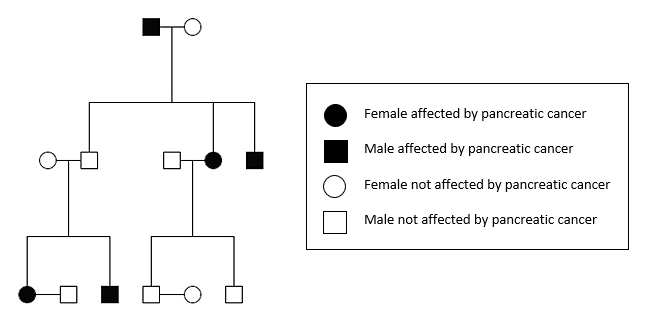
On This Page:
- Can You Inherit Pancreatic Cancer?
- What Is Genetic Counseling?
- Should You Get Genetic Counseling for Pancreatic Cancer?
- How to Find a Genetic Counselor
- Preparing for Genetic Counseling
- What to Expect During Your Consultation
- What to Expect After Testing
- Keeping Track of Your Genetic Information
- Does Insurance Cover Genetic Counseling and Medical Tests?
- Other Things to Know
Can You Inherit Pancreatic Cancer?
All cancers begin when DNA mutates, or changes, which can cause cells to divide and grow out of control. In most pancreatic cancer cases, factors such as smoking, obesity and aging seem to cause these mutations.
But in some cases, mutated DNA can pass from generation to generation. These mutations may lead to hereditary (familial) pancreatic cancer. Only about 10% of pancreatic cancers are considered hereditary.
There are no early detection methods for pancreatic cancer. But there are ways to learn more about a person’s risk of developing pancreatic cancer, such as genetic counseling.
What Is Genetic Counseling?
Genetic counseling is a way to learn about a person’s risk for developing a certain disease or medical condition, like pancreatic cancer. You get genetic counseling from a genetic counselor who holds a graduate degree in medical genetics and counseling. They are trained in the scientific, medical and emotional aspects of inherited disease.
Genetic counseling:
- Helps people understand whether they may be at higher risk for pancreatic cancer
- Educates people about the pattern of an inherited disease
- Finds out the risk that the disease may happen again in the family
- Allows people to work with a genetic counselor for support if it is determined that they are at a higher risk of developing an inherited disease or condition
- Helps people make informed choices for both risk management and prevention
Should You Get Genetic Counseling for Pancreatic Cancer?
If you are a first-degree relative of someone diagnosed with pancreatic cancer, your family member with pancreatic cancer is strongly recommended to undergo genetic testing for inherited mutations.
- Negative results often mean you do not need to get genetic testing.
- If the results are positive, unknown or if you have several close family members with cancer, the Pancreatic Cancer Action Network recommends you consult with a genetic counselor to determine if you should get genetic testing for inherited cancer risk and if you should discuss options for monitoring.
You may also consider genetic counseling if any of the following are true for you or at least one of your family members:
- You have an inherited genetic syndrome associated with pancreatic cancer
- Multiple family members diagnosed with pancreatic cancer in the same or back-to-back generations
- Pancreatic cancer in two or more generations on the same side of the family
- Early onset of pancreatic cancer (younger than 50 years old)
- Diagnosis of more than one primary cancer in the same person
People who are already diagnosed with pancreatic cancer should also get genetic testing for inherited mutations, as well as tumor tissue biomarker testing, even if they do not have a personal or family history of cancer. These tests will help inform treatment options. If testing shows a genetic mutation, then the patient’s family members could consider seeing a genetic counselor and getting tested as well.
Talk to your doctor or genetic counselor about types of genetic tests. Tests through their offices include much stronger information than those available at your drugstore or online.
Contact PanCAN Patient Services for more information about pancreatic cancer risk, genetic counseling, genetic testing and screening programs.
How to Find a Genetic Counselor
To find a genetic counselor in your area, you can contact:
- PanCAN Patient Services
- Your local cancer center and ask to speak with the cancer genetics department
- The National Society of Genetic Counselors (NSGC) at 312-321-6834 or nsgc.org
- The American Board of Genetic Counseling (ABGC) at 913-222-8661 or abgc.net
Preparing for Genetic Counseling
Genetic counselors need information about your family medical history. Be ready to give the counselor information about the following for yourself and three generations before you:
- Serious illnesses, birth defects and inherited disorders
- Any relatives who have or had cancer and their age at diagnosis
- The age and exact cause of death for any deceased relatives
Our family history worksheet can help you record some of this information.
Be as certain as possible about the cancer types that relatives have or had. Though your main concern may be pancreatic cancer, all cancers in your immediate family are important.
Also, do your best to determine primary cancer sites. Primary cancer is the site where the cancer started. This is different from the metastatic site, which is where the disease may have spread. For example, even if cancer is first found in the liver, it may have spread there from the pancreas. In that case, the primary cancer is pancreatic cancer.
Getting the family members’ pathology report can give you this information. You should get other family members’ help in gathering this information. Bring your family history and your own medical records to your in-person meeting with the genetic counselor.
What to Expect During Your Consultation
During consultations, genetic counselors usually discuss:
- Overall cancer risk
- Hereditary risk
- Options for medical and lifestyle management
To determine your overall risk of developing cancer, the genetic counselor develops a pedigree. A pedigree is a chart that shows your relation to relatives who are and are not affected by pancreatic and other cancers. A pedigree includes:
- First-degree relatives (parents, brothers, sisters and children)
- Second-degree relatives (aunts, uncles and grandparents)
- Third-degree relatives (first cousins)
The genetic counselor uses your family’s medical records to build the pedigree.
The genetic counselor completes your pedigree and helps you decide if you should have any genetic or medical tests. These tests can range from blood tests to skin biopsies.
What to Expect After Testing
After collecting your records and getting your test results, the genetic counselor may be able to determine your risk for developing pancreatic cancer. They can also use the pedigree to estimate the risk your family members face.
Your counselor may request to meet with you a second time to share the results. They will also discuss medical and lifestyle management as well as screening options at this time.
Genetic counselors can help you decide what options are right for you and your family. They do not tell you what choice to make.
Often, the biggest challenge of genetic counseling is helping families deal with any emotional, medical and financial issues related to the disease. They may also refer you to psychologists who specialize in this type of counseling.
Keeping Track of Your Genetic Information
Genetic counselors usually have resources about topics discussed during your session. You may also want to bring a friend or family member to your consultation. A second person can give you support and write down important information you may have missed.
If any information is added to your medical records, ask for a copy. While confidentiality is very important in genetic counseling, you have a right to know and understand your private information.
Does Insurance Cover Genetic Counseling and Medical Tests?
The cost for a genetic counseling session ranges from $125 to $500. While each insurance plan is different, insurance often covers this cost.
Genetic tests also have a fee. Depending on the gene tested, the fees can range from $50 to several thousand dollars. Insurance may or may not cover these tests.
One of the genetic counselor’s roles is to advocate on your behalf. They can speak with your insurance company about the importance of genetic counseling and testing and help get the testing covered.
Genetic counseling and testing recommendations for pancreatic cancer patients’ first-degree relatives are new. Some insurance companies may not yet be covering testing for this group. Your genetic counselor and the Pancreatic Cancer Action Network can give you information to give to your insurance company to support your case for genetic counseling and testing.
The Genetic Information Nondiscrimination Act (GINA) is a federal law that protects Americans against genetic discrimination with regards to health insurance and employment. This means that group and individual health insurance companies may not remove your coverage or change contribution and premium amounts if they find you have a high risk of developing pancreatic cancer or another genetic disease.
Other Things to Know
Deciding to consult with a genetic counselor is very personal. Do not choose to do so without considering the medical, emotional and family issues that come with it.
If you meet with a genetic counselor, you do not have to get genetic testing. It is only a way to better understand your cancer risk and related management choices.
If multiple family members have developed pancreatic cancer, consider joining a family registry. Family registries, also called genetic registries, collect information about families with multiple pancreatic cancer cases. Researchers hope this information leads to an improved understanding of the disease and its causes.
PanCAN Patient Services can provide a list of pancreatic cancer family registries.
We’re Here to Help
For more information about pancreatic cancer risk, genetic counseling and genetic testing, contact PanCAN Patient Services.
Related Topics
-
Genetic Mutations
Find out what hereditary disorders are connected to pancreatic cancer.
-
Risk Factors
Learn what makes people more likely to get pancreatic cancer.
-
Early Detection
See why pancreatic cancer is usually found late and what research efforts are underway.
Information reviewed by PanCAN’s Scientific and Medical Advisory Board, who are experts in the field from such institutions as University of Pennsylvania, Memorial Sloan-Kettering Cancer Center, Virginia Mason Medical Center and more.
Information provided by the Pancreatic Cancer Action Network, Inc. (“PanCAN”) is not a substitute for medical advice, diagnosis, treatment or other health care services. PanCAN may provide information to you about physicians, products, services, clinical trials or treatments related to pancreatic cancer, but PanCAN does not recommend nor endorse any particular health care resource. In addition, please note any personal information you provide to PanCAN’s staff during telephone and/or email communications may be stored and used to help PanCAN achieve its mission of assisting patients with, and finding cures and treatments for, pancreatic cancer. Stored constituent information may be used to inform PanCAN programs and activities. Information also may be provided in aggregate or limited formats to third parties to guide future pancreatic cancer research and education efforts. PanCAN will not provide personal directly identifying information (such as your name or contact information) to such third parties without your prior written consent unless required or permitted by law to do so. For more information on how we may use your information, you can find our privacy policy on our website at https://www.pancan.org/privacy/.






